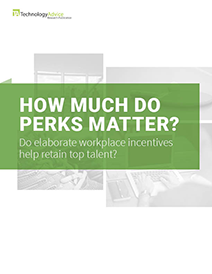It’s no secret that employee engagement, retention, and turnover are top challenges for organizations. In order to overcome these challenges, companies must adapt.
The workplace as we know it is at a crossroads:
Smart leaders are measuring productivity by output — not by hours worked.
Broadband adoption, mobile phones, smart devices, and improved project management and collaboration tools have changed the way teams communicate.
A new generation is surging into the workplace.
These changes and trends have led to a workforce that demands flexibility. But despite evolving employee preferences and expectations, many companies have workplace policies that have failed to mature. In order to attract and retain talent, organizations must redefine “work.”

Ready to redefine “work”? The following steps can help you adapt to a flexible workplace:
- Survey employees about working preferences. Simply gathering information on how your employees prefer to work will pinpoint where your work policies need improvement.
- Create and communicate flexible work policies. Once you know what your employees actually want, update your policies to reflect these expectations. Of course, it can be a shock to transition to telecommuting after working in an office full-time. For many businesses, a gradual change might be necessary. To test the waters, consider offering employees flexible work hours, or just 1-2 work from home days a week. Then tweak your new policy based on feedback and successes.
- Align IT, HR, and Operations to facilitate remote employees. Ensure employees have the technology needed to work from home, clear expectations about performance and goals, and an understanding of workplace policies.
- Reward employee achievements rather than hours worked. In many companies, measures of productivity and success are broken — bosses publicly shame workers for tardiness or employees are promoted for working late, even if it’s just for show. Define departmental and employee requirements in a measurable way, so that your workforce is motivated by success and not hours worked.
Flexible working and telecommuting fuel economic growth, business success, and worker happiness. And it can differentiate your company from competitors. If the nature of your company’s work does not necessitate a centralized location (and this is increasingly becoming so), moving to a flexible, results-oriented workplace should be seriously considered.
Top Human Resources Software Recommendations

